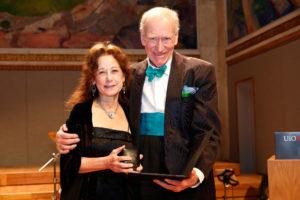by Buck Institute
January 21, 2015 . Press Release
Buck Institute faculty Judith Campisi receives first Olav Thon Foundation Prize
The Olav Thon Foundation, Norway’s largest charitable organization, has awarded its first international research award in the medical and natural sciences to Buck Institute faculty Judith Campisi, PhD, and Tel Aviv University Professor Yosef Shiloh. The prize money, 5,000,000 Norwegian Kroner (approximately $660,000) was split between the two of them. Campisi will go to Oslo to receive the award at a March 5th ceremony.

Olav Thon Foundation Prizes - Universitetes Aula
Campisi was recognized for her pioneering work on the connection between aging and cancer and the process of cellular senescence, which is linked to chronic inflammation. According to the Foundation, “Campisi’s research is highly acclaimed in the international community of scientists, occupying the field between molecular biology and age-related cell degeneration. Through her outstanding contributions she has contributed significantly in turning ‘ageing’ into an exciting and prestigious domain of research.”
“Scientists are always heartened to receive recognition for their work,” said Campisi, who is a Fellow of the American Association for the Advancement of Science and the recipient of numerous awards including the Longevity Prize from the Ipsen Foundation. “I thank the Foundation for their support and for appreciating the need to advance the field of aging research.” According to the Foundation, “Considering the aging of the population, it is vital to secure for our seniors a healthy life, not only for their own sense of wellbeing but also for their being able to contribute to their social environment. This is where the larger promise of Campisi’s research lies.”
Cancer, aging and inflammation Campisi’s highly acclaimed research integrates the genetic, environmental and evolutionary forces that result in aging and age-related diseases, and identifies pathways that can be modified to mitigate basic aging processes.
Campisi is widely recognized for the emerging focus on “inflamm-aging” based on her work on senescent cells --– a process whereby cells permanently lose the ability to divide when they are stressed. Senescence suppresses cancer by halting the growth of premalignant cells, but it is also suspected of driving the aging process. Senescent cells, which accumulate over time, release a continual cascade of inflammatory cytokines, chemokines, growth factors and proteases. It is a process that sets up the surrounding tissue for a host of maladies including arthritis, atherosclerosis and late life cancer.
Science is showing that while chronological aging is inevitable, biological aging is malleable. There's a part of it that you can fight, and we are getting closer and closer to winning that fight.
Eric Verdin, MD, Buck Institute President and CEO